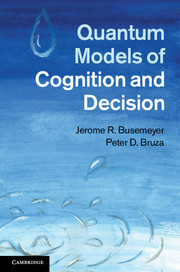Book contents
- Frontmatter
- Contents
- Preface
- Acknowledgments
- 1 Why use quantum theory for cognition and decision? Some compelling reasons
- 2 What is quantum theory? An elementary introduction
- 3 What can quantum theory predict? Predicting question order effects on attitudes
- 4 How to apply quantum theory? Accounting for human probability judgment errors
- 5 Quantum-inspired models of concept combinations
- 6 An application of quantum theory to conjoint memory recognition
- 7 Quantum-like models of human semantic space
- 8 What about quantum dynamics? More advanced principles
- 9 What is the quantum advantage? Applications to decision making
- 10 How to model human information processing using quantum information theory
- 11 Can quantum systems learn? Quantum updating
- 12 What are the future prospects for quantum cognition and decision?
- Appendices
- References
- Index
Preface
Published online by Cambridge University Press: 05 August 2012
- Frontmatter
- Contents
- Preface
- Acknowledgments
- 1 Why use quantum theory for cognition and decision? Some compelling reasons
- 2 What is quantum theory? An elementary introduction
- 3 What can quantum theory predict? Predicting question order effects on attitudes
- 4 How to apply quantum theory? Accounting for human probability judgment errors
- 5 Quantum-inspired models of concept combinations
- 6 An application of quantum theory to conjoint memory recognition
- 7 Quantum-like models of human semantic space
- 8 What about quantum dynamics? More advanced principles
- 9 What is the quantum advantage? Applications to decision making
- 10 How to model human information processing using quantum information theory
- 11 Can quantum systems learn? Quantum updating
- 12 What are the future prospects for quantum cognition and decision?
- Appendices
- References
- Index
Summary
Rationale
The purpose of this book is to introduce the application of quantum theory to cognitive and decision scientists. At first sight it may seem bizarre, even ridiculous, to draw a connection between cognition and decision making – research lying within the realm of day-to-day human behavior – on the one hand and quantum mechanics – a highly successful theory for modelling subatomic phenomena – on the other hand. Yet there are good scientific reasons for doing so, which is leading a growing number of researchers to examine quantum theory as a way to understand perplexing findings and stubborn problems within their own fields. Hence this book. Given the nascent state of this field, some words of justification are warranted. The research just mentioned is not concerned with modelling the brain using quantum mechanics, nor is it directly concerned with the idea of the brain as a quantum computer. Instead it turns to quantum theory as a fresh conceptual framework for explaining empirical puzzles, as well as a rich new source of alternative formal tools. To convey the idea that researchers in this area are not doing quantum mechanics, various modifiers have been proposed to describe this work, such as quantum-like models of cognition, cognitive models based on quantum structure, or generalized quantum models.
There are two aspects of quantum theory which open the door to addressing problems facing cognition and decision in a totally new light.
- Type
- Chapter
- Information
- Quantum Models of Cognition and Decision , pp. xi - xivPublisher: Cambridge University PressPrint publication year: 2012

